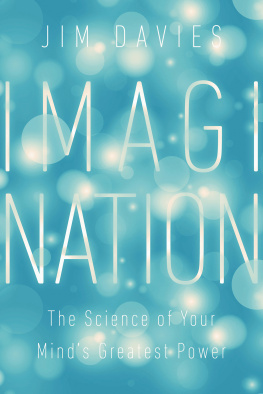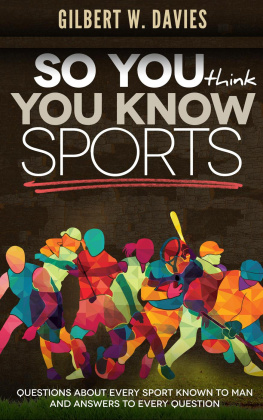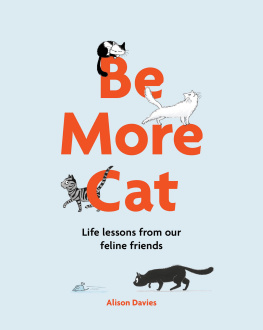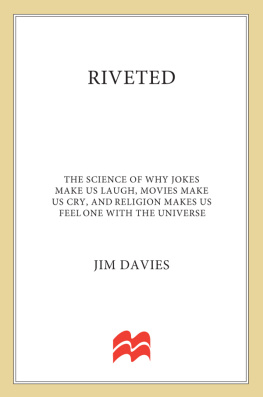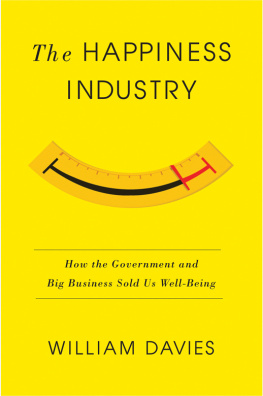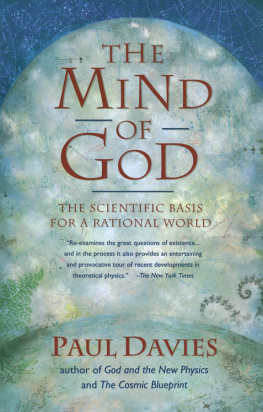Jim Davies - Being the Person Your Dog Thinks You Are: The Science of a Better You
Here you can read online Jim Davies - Being the Person Your Dog Thinks You Are: The Science of a Better You full text of the book (entire story) in english for free. Download pdf and epub, get meaning, cover and reviews about this ebook. year: 2021, publisher: Pegasus Books, genre: Romance novel. Description of the work, (preface) as well as reviews are available. Best literature library LitArk.com created for fans of good reading and offers a wide selection of genres:
Romance novel
Science fiction
Adventure
Detective
Science
History
Home and family
Prose
Art
Politics
Computer
Non-fiction
Religion
Business
Children
Humor
Choose a favorite category and find really read worthwhile books. Enjoy immersion in the world of imagination, feel the emotions of the characters or learn something new for yourself, make an fascinating discovery.

- Book:Being the Person Your Dog Thinks You Are: The Science of a Better You
- Author:
- Publisher:Pegasus Books
- Genre:
- Year:2021
- Rating:5 / 5
- Favourites:Add to favourites
- Your mark:
- 100
- 1
- 2
- 3
- 4
- 5
Being the Person Your Dog Thinks You Are: The Science of a Better You: summary, description and annotation
We offer to read an annotation, description, summary or preface (depends on what the author of the book "Being the Person Your Dog Thinks You Are: The Science of a Better You" wrote himself). If you haven't found the necessary information about the book — write in the comments, we will try to find it.
Jim Davies: author's other books
Who wrote Being the Person Your Dog Thinks You Are: The Science of a Better You? Find out the surname, the name of the author of the book and a list of all author's works by series.
Being the Person Your Dog Thinks You Are: The Science of a Better You — read online for free the complete book (whole text) full work
Below is the text of the book, divided by pages. System saving the place of the last page read, allows you to conveniently read the book "Being the Person Your Dog Thinks You Are: The Science of a Better You" online for free, without having to search again every time where you left off. Put a bookmark, and you can go to the page where you finished reading at any time.
Font size:
Interval:
Bookmark:
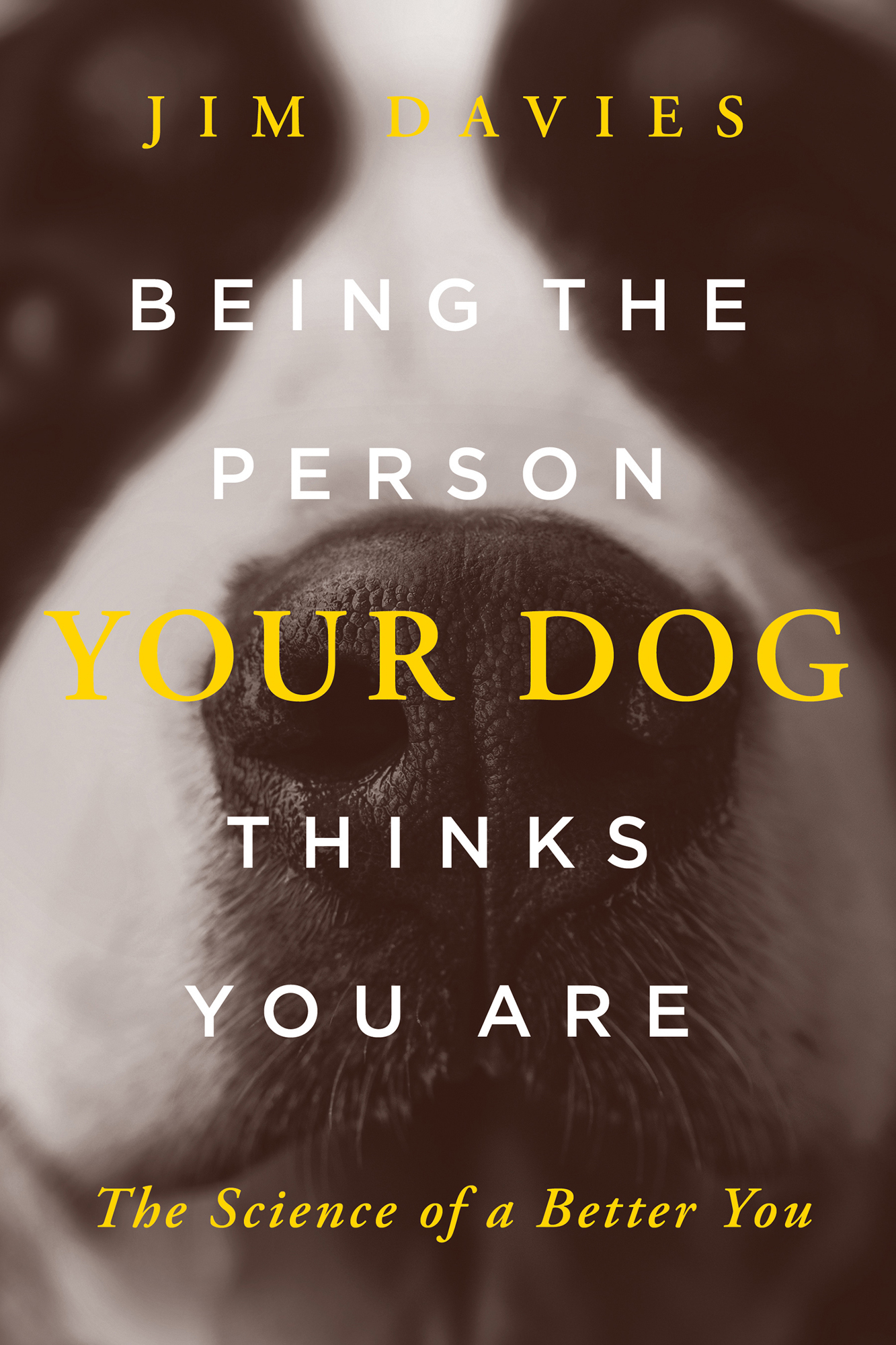

ALSO BY JIM DAVIES
NONFICTION
Riveted: The Science of Why Jokes Make Us Laugh, Movies Make Us Cry, and Religion Makes Us Feel One with the Universe
Imagination: The Science of Your Minds Greatest Power
SERIALIZED FICTION
Eve Pixiedrowner and the Micean Council (at alteredrealitymag.com)
PODCASTING
Minding the Brain (mindingthebrainpodcast.com)
You can follow Jim Davies at @AuthorJimDavies on Facebook and at @DrJimDavies on Twitter.
BEING THE PERSON YOUR DOG THINKS YOU ARE
Pegasus Books, Ltd.
148 West 37th Street, 13th Floor
New York, NY 10018
Copyright 2021 by Jim Davies
First Pegasus Books cloth edition February 2021
Interior design by Maria Fernandez
Cover design by Faceout Studio, Spencer Fuller
Cover Art from Stocksy
Author Photo by Daniel Thompson
All rights reserved. No part of this book may be reproduced in whole or in part without written permission from the publisher, except by reviewers who may quote brief excerpts in connection with a review in a newspaper, magazine, or electronic publication; nor may any part of this book be reproduced, stored in a retrieval system, or transmitted in any form or by any means electronic, mechanical, photocopying, recording, or other, without written permission from the publisher.
Library of Congress Cataloging-in-Publication Data is available.
ISBN: 978-1-64313-650-9
Ebook ISBN: 978-1-64313-651-6
Distributed by Simon & Schuster
www.pegasusbooks.com
To Darren McKee
M ost of the work cited here is from psychology literature. If I mention a scientist or other scholar without their occupation, assume they are a psychologist. I will tag others as neuroscientists, economists, and so on as needed.
Theres some neuroscience in this book. Like all popular accounts of neuroscience, whats presented here is a simplification. The brain is really, really, really complex. I mean mad complex. Some people, even some who have read Eminems lyrics, say its the most complex object in the known universe. If you havent studied neuroscience, you have no idea how deep the rabbit hole goes.
My colleague and podcast cohost, neuroscientist Kim Hellemans, told me that its common in undergraduate education to teach one thing to the students in their first and second years to only tell them later that what they were taught before isnt quite truethe reality is much more complex. But if you try to teach whats actually going on in the brain right away, with no simplification, its hard to get off the ground at all with any idea of whats going on. Useful fictions become the scaffolding for an understanding of the deeper ideas that will be better understood as one climbs it.
To understand what neuroscientists actually think about how the brain works requires reading primary materialarticles in neuroscience journals. Unfortunately these papers are all but incomprehensible to anyone without a graduate degree in neuroscience (my graduate degrees are in psychology and computer science, so I have trouble with many of them, too).
Furthermore, there are enormous controversies in neuroscience, and many of the things I will say about the brain will be in conflict with what some neuroscientists believe. I can guarantee you that for everything I say about the brain some neuroscientist agrees with me, but rather than burdening you with endless hedges and qualifications, Im just going to tell you now that many things I say about the brain are still debated but the account Im giving you here is plausible by the standards of at least some qualified neuroscientists.
Technically, we dont encounter this in scientific psychology, except in the most complex areas. When I simplify a psychology theory, I will say so. But rest assured that everything I say about the brain is a simplification. If you want more detail, I encourage you to use the references I cite as a treasure map and start digging.
W hether or not its completely true, we strongly feel that dogs look at us with love and awe. Our dogs make us feel like we are important and deserving of love, even when we dont feel that from people in our lives. I like the vague, demigod feeling I get from a dogs attention. Its something to live up to. But a dogs love is big on heart and short on specifics. This book is about the specifics.
In this book Im going to talk about what you can do to make yourself better in three major areas that people care about: personal productivity, happiness, and moral goodness.
Im a scientist, and Im going to shed light on these issues and our ultimate goal of improving both ourselves and the world around us through a scientific lens. Science is often numerical in nature, and the wonderful thing about numbers it that you can look at two of them and know which one is bigger than the other. Isnt that exciting?
It is, when you consider that many qualitative analyses dont enjoy this benefit. If having a bit more income makes you happier, and spending a bit more time with your friends makes you happier, too, without numbers you cant tell their relative importance.
Even more fundamentally, maybe one of them doesnt really do any good at all. You can read all kinds of things telling you that this or that will make your life better, but without numbers its hard to tell if it actually does. If it does, it matters. And some things matter much more than others.
Numbers can tell you if something is ineffectual, or has an effect so small that its not worth concerning yourself withthese things unmatter.
Then there are things that are supposed to help, but actually hurt. These things antimatter. Of course, the word antimatter has another meaning, in physics, but Im using it differently here because there is no word in English that means something that appears to make things better but actually makes things worse.
Sometimes there are things that matter a little bit. Sometimes it might make sense to focus on these things. This is the idea behind the idiom that every little bit helps. But unfortunately, focusing on things that matter only a little bit has a hidden cost. The resources (energy, money, attention, time, or whatever else) youre putting into things that matter only little bit are not going toward something that matters more. Furthermore, everyone has in their minds a bunch of equilibria that they are trying to maintain, that we can think of as psychological thermostats. For example, you dont want to be too hungry or too full, so you eat when the hunger thermostat gets too low, and you stop eating when it gets too high. We also have these thermostats for happiness, productivity, and morality.
Lets take a look at climate change as an example. Nowadays lots of people acknowledge that climate change is a real problem and that something should be done about it. One way that people often talk about how they can help reduce climate change is to reduce their energy consumption. And indeed, in many places, reducing your energy consumption does have an effect on reducing climate change. But how much can you really do for the climate by changing the way you live in your own household? Governmental laws and regulations have the potential to have far bigger effects, because they will effectively force many, many people into changing their energy consumption habits. So maybe you should advocate for policy changes instead of taking short showers.
Font size:
Interval:
Bookmark:
Similar books «Being the Person Your Dog Thinks You Are: The Science of a Better You»
Look at similar books to Being the Person Your Dog Thinks You Are: The Science of a Better You. We have selected literature similar in name and meaning in the hope of providing readers with more options to find new, interesting, not yet read works.
Discussion, reviews of the book Being the Person Your Dog Thinks You Are: The Science of a Better You and just readers' own opinions. Leave your comments, write what you think about the work, its meaning or the main characters. Specify what exactly you liked and what you didn't like, and why you think so.

